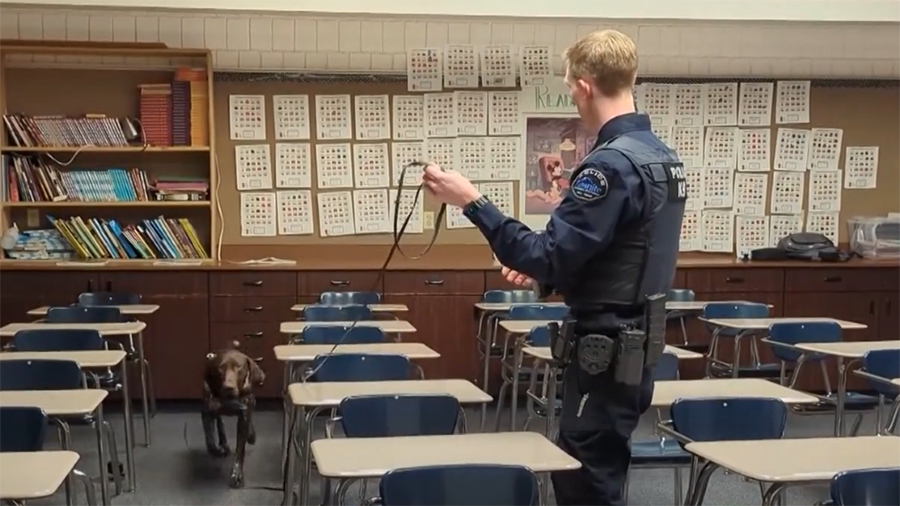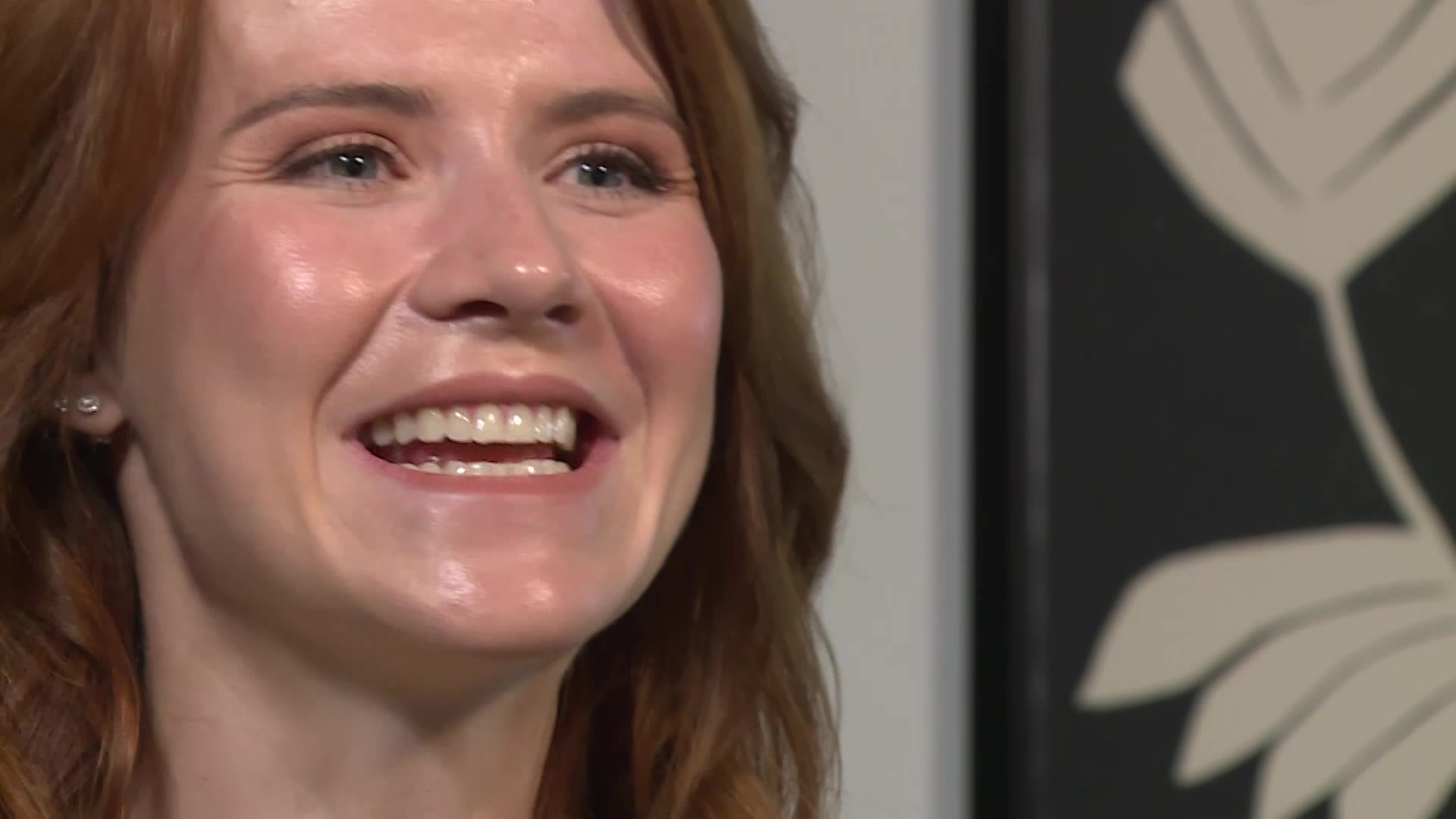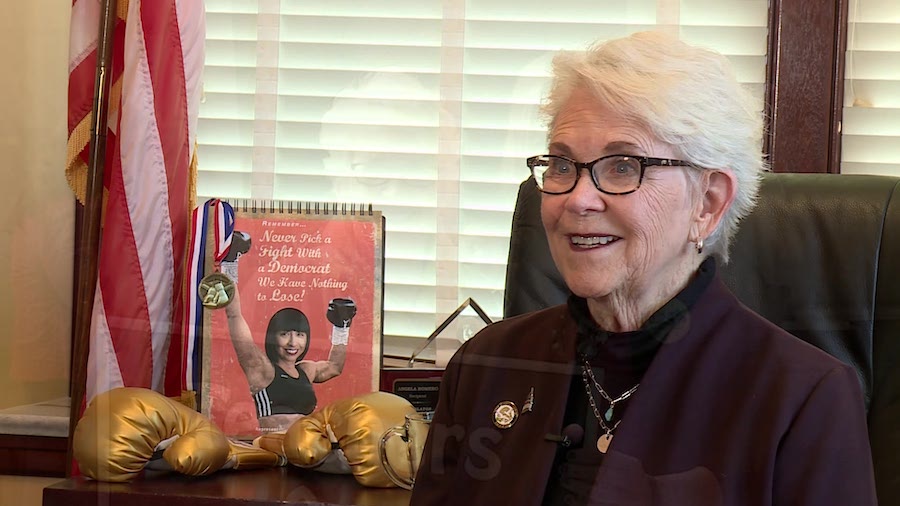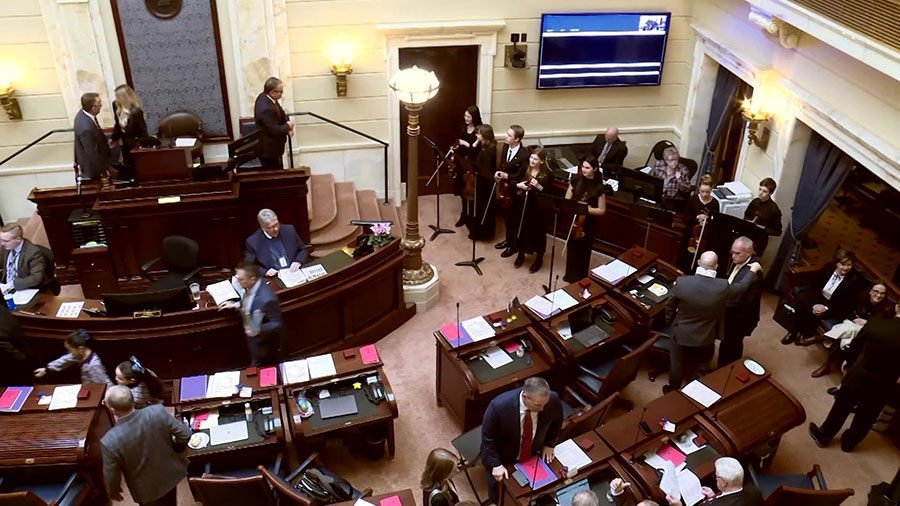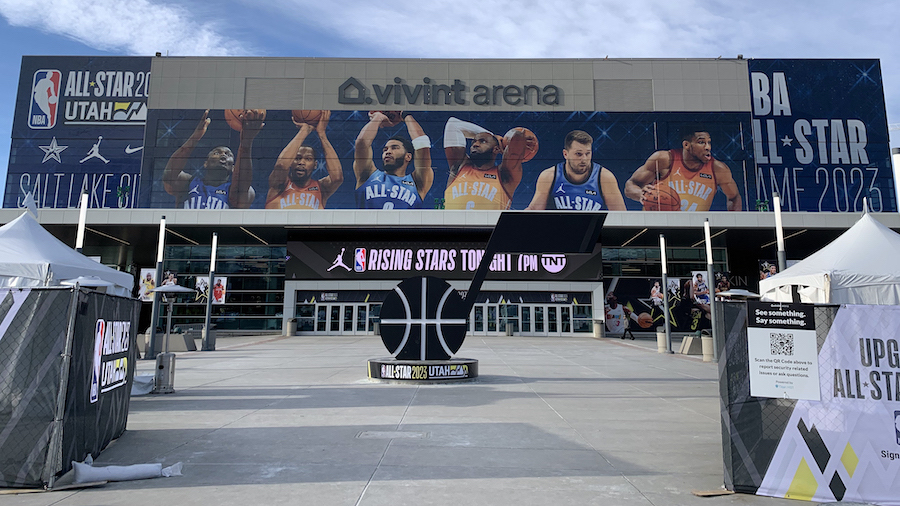A year ago this week, our world started to change.
March 6th 2020, Utah saw its first case of COVID-19.
March 11th, the NBA shut down a jazz game after Rudy Gobert tested positive for the virus.
March 13th, Governor Herbert shut down schools for what he thought would be just two weeks.
March 17th, bars and restaurants shut their doors to indoor dining.
And March 27th, the governor announced the Stay Safe, Stay at Home initiative.
On the other side, Governor Cox announced that by April 1, the state hopes to open vaccinations to any adult who wants one. This week, we sat down with Dr. Angela Dunn, a person most of us had never heard of a year ago. But now there are t shirts that say “I love Dr. Dunn.”
Here’s our conversation with her.
Editor’s note: interview transcript is lightly edited for clarity and readability.
Matt Rascon: You may or may not remember it. So March 5th, a year ago, we gathered at the KSL Broadcast House and had a sort of roundtable discussion with you and with other state leaders. And it was sort of, “What do we expect from COVID-19?” And then the next day, we had our first case.
Dr. Angela Dunn: Was it really the next day? The next day? That’s crazy.
Matt Rascon: One year later, what’s your take on how Utah initially responded to the virus? I know hindsight is 20/20. But what do you think about that?
Dr. Angela Dunn: It’s so interesting. I think it’s just a study on human nature. If you remember the beginning, we didn’t know a lot about COVID. We thought it was spread on our groceries, people were wiping down their FedEx boxes, and we shut down schools, before we even had one case of community spread. There was just a lot of fear, and a lot of momentum behind that fear. And so clearly, you know, as the saying goes, hindsight is going to look like you did way too much. And I think that’s the case here at the beginning. Because now we know it’s spread mostly airborne, it doesn’t impact kids as much, we have ways to protect ourselves that we didn’t have at the beginning. So it was good to be extra cautious.
But I think the key thing we’ve done in the state is we’ve been very flexible in our response. So as we’ve learned a lot more about the virus, how to protect ourselves, how to protect our communities. We’ve changed our response, which has helped us a lot maintain that balance between health and economy.
Matt Rascon: When you look at now that we’re at this point, when you look at the total numbers–and of course, these numbers are actual people–more than 375,000 cases. Around 15,000 hospitalizations. Around 2000 deaths total. What does that tell you as an epidemiologist about how significant this pandemic actually was?
Dr. Angela Dunn: I mean, it’s been huge, right. And we’re definitely not done with it. There’s so much going on in terms of the unknown still with the variants, with reinfection, with vaccine breakthrough cases. So there’s so much we still have to learn that keeps us on our toes. But this has had a significant impact on individual lives and Utah as a whole. It’s really astounding, right?
Matt Rascon: Of course, I didn’t even mention the job losses and economic impact. So fast forward to today, more people are getting vaccinated every day– more people than actually coming down with the virus. How do you see the how far we’ve come?
Dr. Angela Dunn: It’s incredible. I mean, scientists are crazy. We only knew about this virus about a year ago. We already have three effective vaccines that are FDA approved. Again, we know how its spread. I think for a brand new virus to be detected, and to come all the way to where we are now–having effective vaccine and knowing how to protect ourselves–within a year timeframe; it really took worldwide collaboration to really prioritize the effort. And I just, I’m amazed by that,
Matt Rascon: When you look at the numbers and the trend and everything. I think there’s been a lot of question about how much is the vaccine contributing to this? And how much is it just the precautions that we’ve been taking for the last year? How do you see that?
Dr. Angela Dunn: Vaccines are a wonderful thing. We’re not at that point yet where we can rely on vaccines as our only protection against the virus. We really need to get upwards of 70% of of Utahns vaccinated for that to happen. So a large part of our decline in cases is due to consistent policy and consistent actions. You know, changing the course of a pandemic is like changing the course of the Titanic, it takes a while. So having these consistent policies in place for the last three to six months, we’re really reaping the benefits of that now, and no better time to have the benefits of low case counts at the same time we have vaccination, because that’ll help us get to the end even faster.
Matt Rascon: Just this week, we’ve seen Texas open up– say no mass mandates. Other states, lightening up on the restrictions. Even Utah, with a few counties that are now in that moderate transmission phase. Are we doing things right? Are we headed in the right direction?
Dr. Angela Dunn: I think in Utah, our transmission index has proven to be really effective at being sensitive to the changes in cases. So I think it’s a good thing that we’re able to decrease restrictions as the case counts, and hospitalizations, and percent positivity decrease.
I do worry about mask wearing requirements going away. Ideally, that should be the very last thing that goes away, right? We should have schools and bars and restaurants and live events open way before the mask requirement goes away. Because it’s really cost effective. And study after study in Utah show that it saves lives, but also encourages people to engage in the economy. So it’s a win-win from both sides. So I do worry about the mask requirement going away too soon. And that leading to potentially more cases. So personally, I would prefer the mass requirement to remain in place until we have that herd immunity.
Matt Rascon: We’ve seen a few different numbers for herd immunity. In your mind, what does it take? And I assume that includes those who’ve been infected, plus those who have been vaccinated?
Dr. Angela Dunn: This is going to be frustrating, but we don’t know. A lot of experts across the world agree that COVID-19 likely requires between 70 and 80% of individuals to be vaccinated for herd immunity. And the reason why I specify vaccination is because we’re learning more and more, that the immunity you have after being infected with COVID-19 doesn’t really last that long. And it actually can differ from person to person. And so we really want to rely on vaccinating everybody, even if they’ve been infected with COVID-19, to make sure that they have that long lasting immunity.
Matt Rascon: Governor Cox says he’s laid out some expectations, what we expect things to look like in the coming weeks. And of course, it seems like the status quo a lot more into vaccine distribution of the last couple of weeks, we’re just plowing along. He’s said everyone to be eligible for the vaccine by April and back to normal by July 4th.
Dr. Angela Dunn: I definitely think it’s a reasonable goal, and it is possible. Of course, we’re not going to be able to predict the future–I feel like none of our predictions have come true with this pandemic. It will take us continuing to wear masks, physical distancing, and staying home when we’re ill to reach that July 4th goal.
We have identified more and more of the UK variant in the state of Utah. And it’s increasing really quickly. And that is one of those unknowns that could put us at risk for another surge. So to prevent that surge from happening, and to make sure we all have that July 4th–we have parades, and we’re able to gather and have barbecues–we really need to make sure we follow those public health guidance until that point.
Matt Rascon: There seems to be a lot of things you’re optimistic about at this point. But is there anything still kind of keeping you up at night with this pandemic?
Dr. Angela Dunn: Absolutely. Three things that I think put us at risk for another surge. One, of course, is the spread of variants. Two, people being reinfected. And three, are there vaccine breakthrough cases, meaning the vaccine isn’t protecting everyone against infection. And we’re actively monitoring those three things here in Utah. But there’s so much unknown around those three things that if any of them proved to start increasing cases quickly, we’re going to have to turn to our bread-and-butter public health, which is, of course, quarantine, isolation, mask wearing avoiding large gatherings. So it is really concerning, because I know we’re all tired. And to go back to, you know, putting more recommendations in place to avoid large gatherings, I think is going to be really tough for anyone to handle. So that definitely keeps me up at night.
Matt Rascon: What’s the message to of all of us one year later?
Dr. Angela Dunn: Continue to be smart. We are not at the place yet where we can let down our guard. We are getting there. But I think if we have our eye on the on the ball– do we want our schools to open up safely without COVID spreading in the fall? We need to continue driving our case counts down now. So we can have a fun summer. And then kids can go back to school in the fall without any worry of COVID spread before they can get vaccinated. So let’s really continue to be smart and collaborate on reaching that goal.
Matt Rascon: I’ve heard that there are studies underway for kids as young as 12 years old to start getting the vaccine. Do you have any knowledge of when we could see shots in the arms of 12 to 13 year olds?
Dr. Angela Dunn: They are still in early phase trials. So we’re hoping by the end of the summer. But realistically, we won’t have kind of mass vaccinations until well into the fall. So that’s why we really need to make sure as adults, we’re all really taking precautions to protect against the spread of COVID. So our kids can be safe in the fall.
Matt Rascon: If you don’t mind, I’d like to just ask you– being in your position, the head of this task force for Utah, in this response, and everyone’s sort of looking to you become sort of the face of it along with other government leaders? What toll has this taken on you? What is the take away for you from this year?
Dr. Angela Dunn: Well, I feel like you kind of nailed it right there. I’m actually not the head of anything. I don’t have an official role in the response other than making sure the public gets the information they need to protect themselves. And so it has been really exhausting to try to continuously make sure that science and evidence is at the table in the decision making process. I know, it’s not the only thing we need to take into consideration. But definitely public health should be at the table for those. And so it’s been a really, really exhausting year. I don’t know another adjective to describe it. It’s just been exhausting. I look forward to the day where I don’t have weekly press conferences. And at the same time, I’m not worried about susceptible people getting really ill, getting hospitalized and even dying.
Matt Rascon: As we sort of get back to normal, are there things that should be on the minds of people, as far as preparing for another surge or another disease or something down the road? We’ve emphasized the importance of hygiene and sanitation and things like that, as well as those with underlying conditions being at higher risk and impacted the most. Is there something to say just about overall health and kind of preparing in that way?
Dr. Angela Dunn: Yeah, absolutely. I hope what we do after the pandemic is really help our most at-risk communities become healthier and become safer. I think what we’ve learned through this pandemic is that we’re only a save or healthy as the weakest link, right? And so we need to come together as a community to make sure that all of our neighbors and communities have access to quality health care, are able to take preventive measures, so they aren’t at higher risk when the next pandemic hits.
Matt Rascon: Optimistic about what’s to come?
Dr. Angela Dunn: I think I have to be, otherwise I wouldn’t still be in this job. Definitely. I’m hoping that we can use this as an opportunity to catalyze better our public health efforts moving forward.
Matt Rascon: A lot has changed over the last year. we’ve seen the best and worst of people. And we’ve learned a lot. As we head into our new normal, we talked with leaders across health care, business and education, about what we’ve learned and what things will look different. Join us next week as we dive into changes possibly coming to a doctor’s office near you. As we look at COVID one year later. See you next week.
